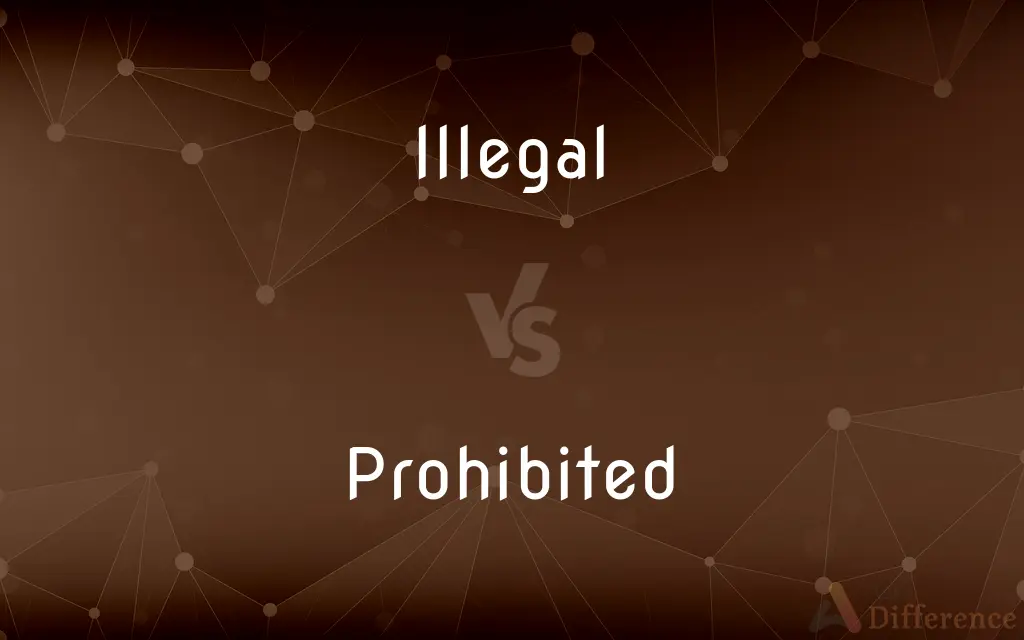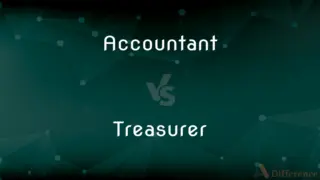Illegal vs. Prohibited — What's the Difference?
By Fiza Rafique & Urooj Arif — Updated on March 18, 2024
Illegal refers to actions violating the law, while prohibited encompasses a wider range of bans, not all of which are legal in nature.

Difference Between Illegal and Prohibited
Table of Contents
ADVERTISEMENT
Key Differences
Illegal actions are those that are explicitly forbidden by law, resulting in criminal penalties or legal sanctions upon violation. These actions are codified in legal statutes and regulations, meaning they have been determined by a governing body to be harmful or undesirable to the public or the state. Examples include theft, assault, and fraud. On the other hand, prohibited activities or items can extend beyond legal restrictions to include rules set by organizations, institutions, or individuals, which may not carry legal penalties but can result in consequences such as suspension, dismissal, or denial of access.
While illegal activities are universally acknowledged within a jurisdiction as being against the law, prohibitions can vary widely depending on the authority setting the rules. For instance, a school may prohibit the use of cell phones in classrooms, or a private business may prohibit smoking on its premises. These prohibitions are enforceable by the entity that established them but do not constitute legal violations in the broader sense.
The concept of illegality is inherently linked to the legal system and the concept of justice, focusing on maintaining public order and protecting individuals' rights. Conversely, prohibitions can be based on a variety of reasons including safety, ethics, policy, or preference, and they can be specific to certain contexts or communities.
Enforcement mechanisms differ significantly between the two: illegal acts are addressed through the criminal justice system, involving police, courts, and potentially correctional facilities. Prohibited actions, however, are enforced by the rules of the particular setting, which might involve security personnel, administrative actions, or internal disciplinary procedures.
The determination of what is illegal is a formal process that involves legislation, judicial rulings, and interpretation of the law, reflecting societal values and ethical standards. In contrast, what is prohibited can be decided by any authority within its own domain, such as parents setting rules for their children, or organizations establishing codes of conduct for their members or employees.
ADVERTISEMENT
Comparison Chart
Definition
Actions against the law.
Actions or items banned by a rule or authority.
Consequences
Legal sanctions or criminal penalties.
Varies; may include dismissal, suspension, or denial of access.
Authority
Governed by law and legal systems.
Established by organizations, institutions, or individuals.
Enforcement
Criminal justice system.
Authority-specific mechanisms.
Basis
Legislation and legal statutes.
Safety, ethics, policy, or preference.
Compare with Definitions
Illegal
Public Order and Safety: Aimed at protecting society.
Driving under the influence is illegal to ensure road safety.
Prohibited
Context-Specific: Can vary widely by setting.
Prohibited behaviors at work may include personal internet use.
Illegal
Violation of Law: Conduct that breaches legal statutes.
Stealing is considered illegal.
Prohibited
Banned by Rule: Not allowed by specific rules or guidelines.
Prohibited from using phones in class.
Illegal
Legal Sanctions: Subject to penalties by law.
Illegal drug trafficking can lead to imprisonment.
Prohibited
Safety, Ethics, or Policy: Reasons behind prohibitions.
Hazardous chemicals are prohibited in consumer products for safety.
Illegal
Uniformity within Jurisdiction: Consistent legal application.
Illegally parking in a handicap spot results in fines everywhere in the jurisdiction.
Prohibited
Authority-Specific Enforcement: Managed by private or organizational rules.
Violating a library’s prohibition on loud conversations may result in being asked to leave.
Illegal
Criminal Justice System: Enforced through courts and law enforcement.
Theft cases are adjudicated in criminal court.
Prohibited
Varied Consequences: Penalties depend on the authority's rules.
Smoking is prohibited in many public spaces, with fines for violations.
Illegal
Prohibited by law.
Prohibited
That has been forbidden; banned
They had deliberately fed prohibited material to their herd
Illegal
Prohibited by official rules
An illegal pass in football.
Prohibited
To forbid by authority
Smoking is prohibited in most theaters.
Illegal
Unacceptable to or not performable by a computer
An illegal operation.
Prohibited
To prevent; preclude
Modesty prohibits me from saying what happened.
Illegal
A person who is not legally authorized to live and work in a country.
Prohibited
Forbidden; unallowed
Illegal
Contrary to or forbidden by law, especially criminal law.
This is illegal, you know!
Nearly 40 million people live in UK areas with illegal air pollution
Their illegal mining operations in Asia, Africa and elsewhere, are protected by officials and police paid to look the other way – and powerful customers in the construction industry who prefer not to ask too many questions.
Prohibited
Simple past tense and past participle of prohibit
Illegal
Breaching certain enacted statutes of positive law; not lawful, not legal (cf. immoral, unethical)
Prohibited
Excluded from use or mention;
Forbidden fruit
In our house dancing and playing cards were out
A taboo subject
Illegal
Forbidden by established rules.
Moving a pawn backward is an illegal move in chess.
Prohibited
Forbidden by law
Illegal
Totally fictitious, and often issued on behalf of a non-existent territory or country.
Illegal
Being or doing something illegally.
Illegal immigrant
Illegal logger
Illegal pilot
Illegal
Being an illegal immigrant; residing in a country illegally.
Illegal
(obsolete) An illegal act or technique.
Illegal
Contraband, esp. illegal substances such as drugs.
Illegal
An illegal immigrant.
Illegal
(espionage) A spy working abroad illegally and undercover, without visible ties to his or her country’s authorities.
Illegal
Not according to, or authorized by, law; specif., contrary to, or in violation of, human law; unlawful; illicit; hence, immoral; as, an illegal act; illegal trade; illegal love.
Illegal
Prohibited by law or by official or accepted rules;
An illegal chess move
Common Curiosities
What makes an action illegal?
An action becomes illegal when it violates laws established by governmental statutes and regulations.
Can something be both illegal and prohibited?
Yes, an action can be both illegal under law and prohibited by specific rules of an organization, such as theft or harassment.
Who determines what is prohibited?
Prohibitions are determined by the authority or body governing the specific context, like workplace policies or school rules.
Are the consequences for illegal and prohibited actions always punitive?
Consequences for illegal actions typically involve legal penalties, while prohibited actions might result in administrative or disciplinary measures.
Do illegal actions affect one’s criminal record?
Yes, convictions for illegal actions typically result in a criminal record, unlike most prohibited actions.
Is consent relevant in determining illegality or prohibition?
Consent can be a key factor in determining the legality of actions but is less relevant to prohibitions, which are based on rules rather than legal statutes.
How are illegal actions enforced?
Through the criminal justice system, involving police, courts, and potentially correctional institutions.
Can prohibitions change more easily than laws?
Yes, because prohibitions are set by individual entities, they can be adapted more readily than laws, which require legislative processes to change.
What’s the difference in authority between illegal and prohibited?
Illegality is determined by laws applicable to the public and enforced by the state, while prohibitions are set by private, organizational, or individual rules.
Can prohibitions lead to legal action?
While prohibitions themselves are not legal actions, violating certain rules, especially in regulated industries, can lead to legal consequences.
Share Your Discovery

Previous Comparison
Beauty vs. Grace
Next Comparison
Accountant vs. TreasurerAuthor Spotlight
Written by
Fiza RafiqueFiza Rafique is a skilled content writer at AskDifference.com, where she meticulously refines and enhances written pieces. Drawing from her vast editorial expertise, Fiza ensures clarity, accuracy, and precision in every article. Passionate about language, she continually seeks to elevate the quality of content for readers worldwide.
Co-written by
Urooj ArifUrooj is a skilled content writer at Ask Difference, known for her exceptional ability to simplify complex topics into engaging and informative content. With a passion for research and a flair for clear, concise writing, she consistently delivers articles that resonate with our diverse audience.














































